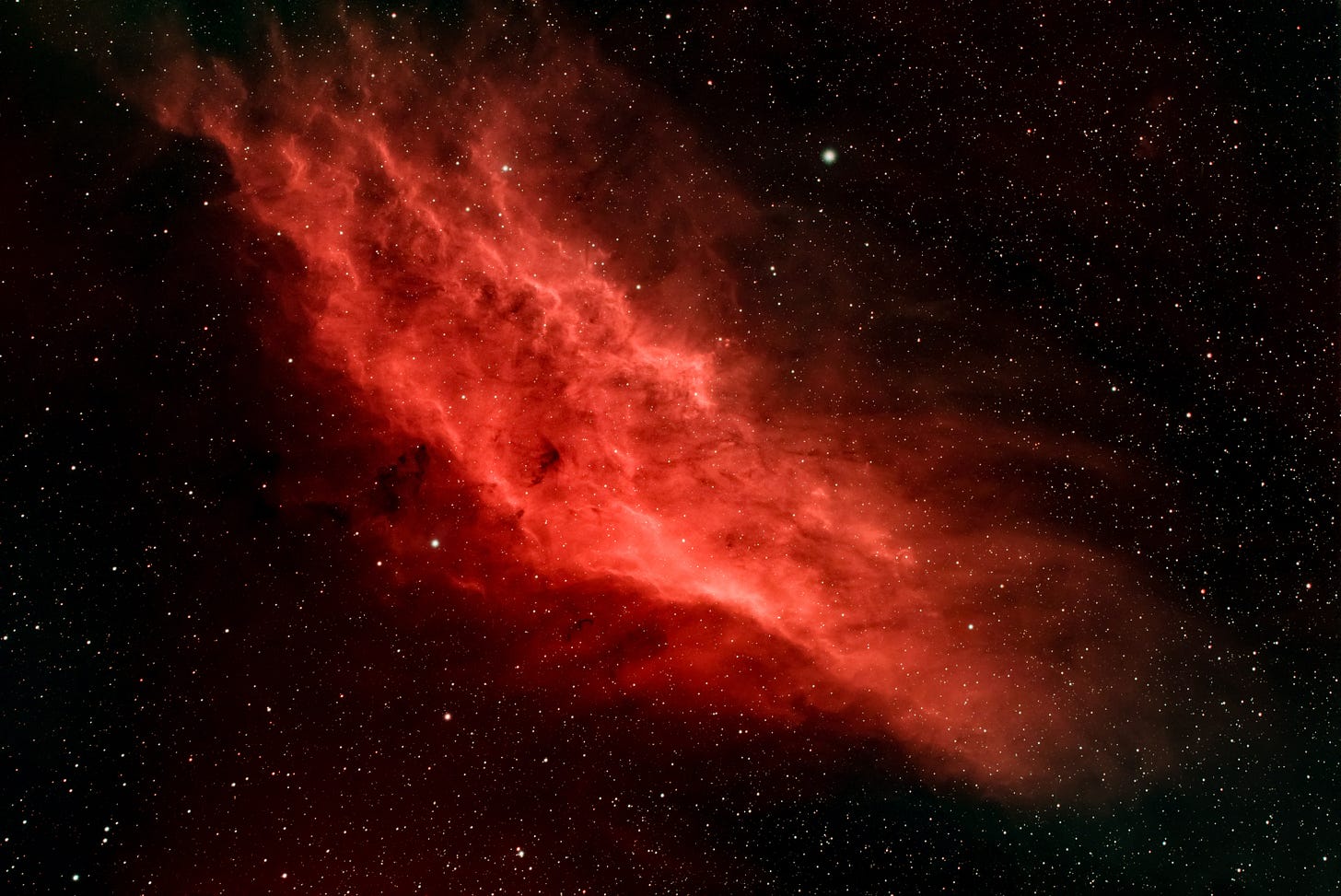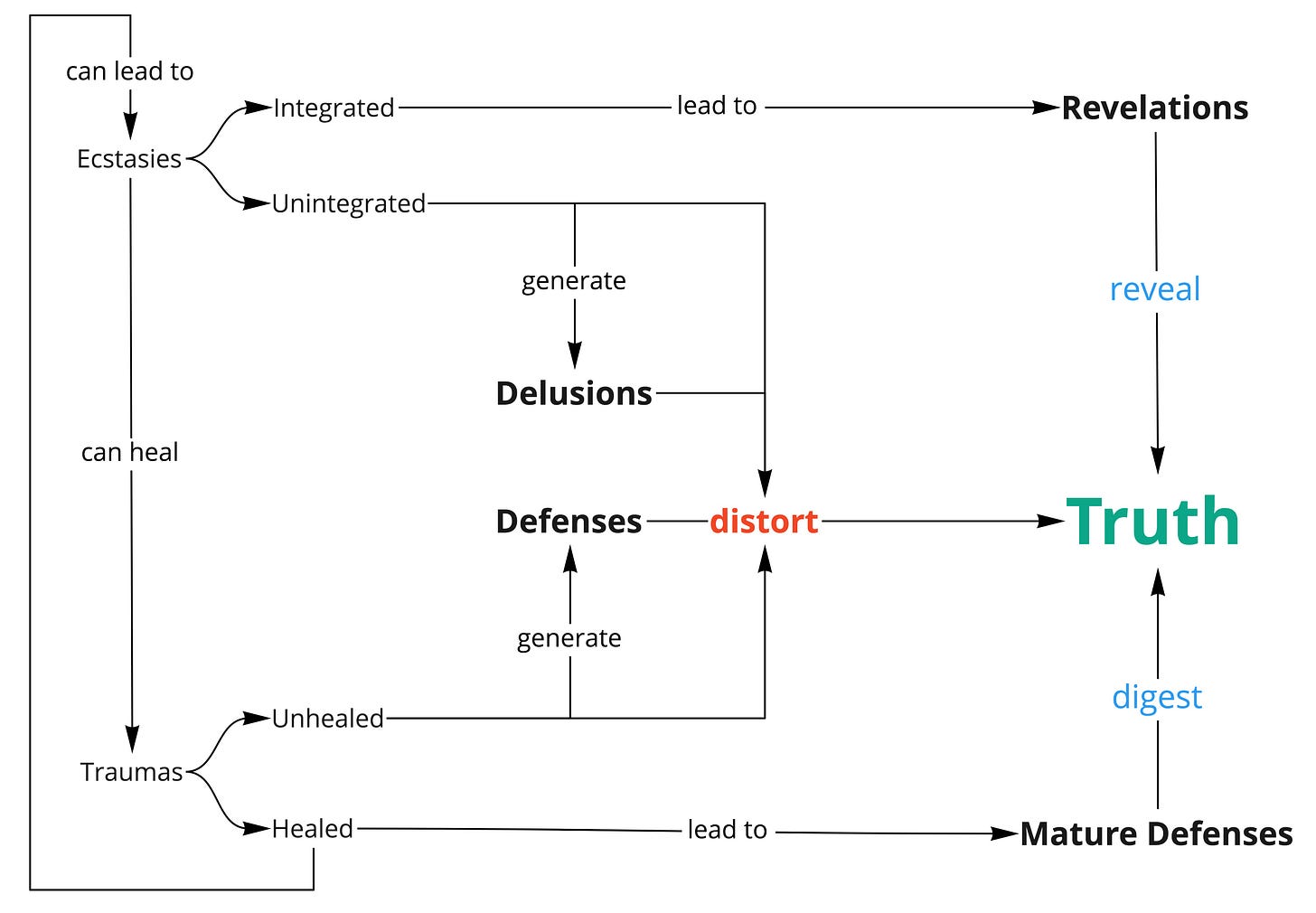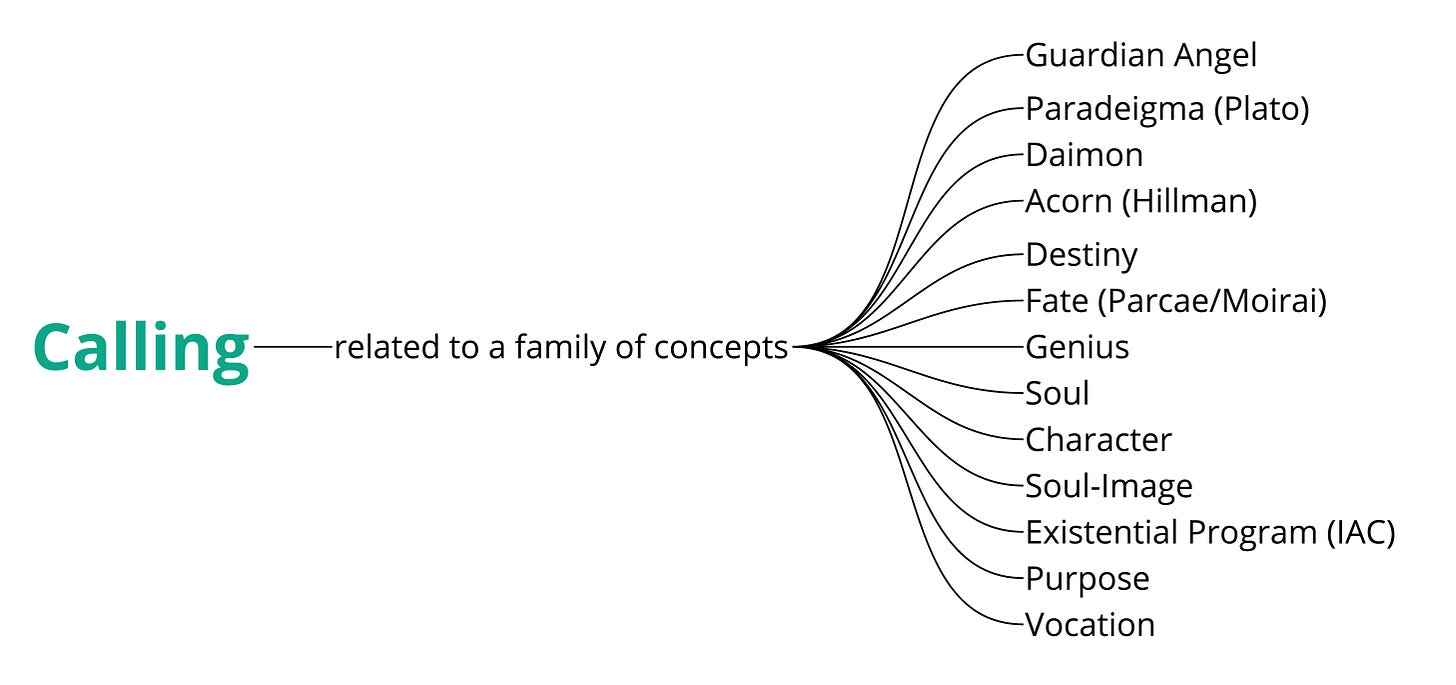The Cosmic Game, Part 2
Evolving through heeding our Calling & the Ultimate Exit leading to an Eternal Return

Before we begin with Part 2 of The Cosmic Game, here’s a quick recap of Part 1:
Certain extraordinary experiences reveal that we are not the character we play in each lifetime, reincarnation is real, and we are effectively immortal.
There is an Otherworld that exists on another plane of existence. When our character dies, we tend to visit it before reincarnating, but can have access even while incarnated. However, if we wanted to be more precise, using the plural Otherworlds would be more accurate since there are many planes of existence beyond the one we experience in everyday life and the one we experience right after death.
Spiritual traditions across the world and throughout history have created all sorts of ways to facilitate crossings into the Otherworlds, understanding the importance of guides to help us integrate what we experience and see there, producing elaborate terminologies around these processes and their effects1.
The experiences related to crossing significant thresholds in the spectrum of awakening, which I call ecstasies, can radically transform those who have them.
Different traditions give a variety of titles to people who cross, depending on how they crossed and how far they’ve gone, what control they have over and during their journeys, and what abilities and virtues they exhibit because of them.
Awakenings are drastic shifts in awareness, that can be both behind and beyond the veil.
Video Games, Delusions, and Defenses
As you may have already noticed from the summary above, there are common elements between popular video games and what we discover about reality and our attempts to describe it. For example:
We play characters that die but can respawn2 back in the game.
There are different levels that you can go through, usually by training to unlock certain skills necessary for navigating them.
There are elaborate rankings and titles that are given to those who have successfully completed the different stages of training and achievement.
In some video games, you can choose which kind of character to play. Many spiritual traditions claim the same is true of the Cosmic Game, that we indeed select both the character and the kind of calling we attempt to fulfill in the game of life, but most of us forget it the moment we are born.
As we accustom ourselves to life, we gradually develop both a model for what we think the game is and for what we’re supposed to do in it. This sensemaking process doesn’t happen in a vacuum but in various environments with the people that raise us3.
During that process, when certain needs are not sufficiently met, or we find ourselves in harmful circumstances, we incur trauma.
Trauma is any type of distressing event or experience that can have an impact on a person's ability to cope and function. Trauma can result in emotional, physical, and psychological harm4.
Traumas and ecstasies are two important factors affecting our relationship to truth:
Our Calling: Evolution, Love & the Cosmic Game
The people and culture that raise us will often overrule our own experience because it doesn’t match theirs or because of individual and collective delusions and defenses. Some parents do champion their children’s calling, others, shun it. The psychologist James Hillman did not believe we are simply a product of our parental upbringing, what he called the parental fallacy, and used studies of identical twins separated at birth to show how easy it is for intrinsic tendencies to be falsely attributed to parental styles5.
Hillman used the term acorn for that seed within us that carries the code of our character, that is not the result of our past but an intrinsic blueprint and forward force, present at birth and throughout our lives, pushing us uniquely to our destiny. Some hear it as a voice, others sense it as a feeling. The Greeks called it the daimon; the Romans, the genius; both instances of tutelary deities, mentoring us from other planes towards the fulfillment of our destiny. The world’s most archetypical philosopher, Socrates, openly admitted being guided by it according to Plato6 and Plutarch7.
Though each of these concepts has its own hue of meaning, they are all interrelated in one way or another, so I’ll use the word calling as an umbrella term, with metaphors and analogies related to seeds or trees. For example, though different seeds resemble each other, not all of them grow into the same kind of tree or plant. Some seeds grow into massive redwoods, others into small alfalfa. Throughout our lives, others will make judgments as to who we are, what we should do, and who we ought to become. But few of them can feel the inner workings of our soul. It’s crucial to discern who to listen to, accept our nature, and be patient with our current level of development. We won’t grow properly if others convince us we’re alfalfa when we’re a redwood, and it’s absurd for the redwood seed to judge itself for not being a fully grown redwood when it’s only in the beginning of its development.
From the myriad of options out there, some attract us more than others for reasons that are often inscrutable. If we don’t trust the desires of our souls, we will never look for the sun we need to grow into who we are meant to be. However, unhealed traumas and unintegrated ecstasies often lead to defenses and delusions that skew our judgments and desires towards goals that are not conducive to our evolution. The solution is not to distrust ourselves but to heal and integrate. For if we give in to distrusting ourselves, abdicating the responsibility we have to the unfolding of our destiny by outsourcing it to external authorities who often have either limited vision or bad intentions, we will sabotage our growth or fail to discover our own ignorance and instead suffer that of others. Sagacious guides and mentors can help too, as long as they don’t end up becoming our crutches or nannies. Our growth is rarely linear, as Nietzsche reminds us:
Like trees we grow—this is hard to understand, as is all life—not in one place only but everywhere, not in one direction but equally upward and outward and inward and downward; our energy is at work simultaneously in the trunk, branches, and roots; we are no longer free to do only one particular thing, to be only one particular thing.8
Evolution happens on different planes, that we navigate with a variety of vehicles. Our physical body is one such vehicle that allows us to navigate our everyday incarnated life. Our soul is another, that allows us to journey between lives. There are a lot of discussions among the various spiritual traditions across the centuries with respect to how many planes and vehicles there are, the distinctions between them, how many we occupy etc. Though how we slice and dice concepts to map reality is important, it is even more important that we are aware that such discussions and distinctions exist, which enable us to distinguish and become aware of the various levels of our being, and that there are paths and practices that allow you to experience the need for coming up with those distinctions in the first place.
A mind-boggling aspect to remember is that development and insight are not uniform across the different planes and vehicles. An old soul can inhabit a baby’s body. An insight unavailable in one vehicle becomes available in another. Moreover, attributes of one plane do not always carry over to another. Believing they do, especially when it comes to that plane that requires the disposal of all vehicles to become available, would simply be a category mistake. I’ll do my best to illustrate the above with an analogy.
When I decide to play a game, I deliberately subject myself to a set of limitations, the rules of the game, to play it. I am aware that life is not confined to those rules and that there are moves that I am capable of performing outside it that are impossible within it. For example, I can walk hundreds of steps while holding a basketball without dribbling it in life. But if I were to do that during a basketball game, it would be a violation of the rules, called traveling.
However, suppose something happened, and I forgot that my life is not confined to the rules of basketball. If I was holding a basketball, I would dribble every time I walked more than a few steps. My focus would be on how to develop my dribbling and other basketball skills required to win, with accumulating points by putting basketballs in baskets being a high priority intimately correlated with success in life. Incarnation is like that. We are born into the game of life, forgetting we come from a place that permits it to commence but is not equivalent to it, just like the everyday world is a “place” from which we can choose to approach a basketball court and start playing a game of basketball but is not equivalent or exhausted by it.
When some people work a job for too long, they forget they are playing to such an extent that their entire identity becomes merged with it. They become doctors, soldiers, golfers, etc. to the point where they say that this is who they are, and if they get fired or are unable to play that role anymore, they often fall into depression not knowing what to do or who to be. This is how deeply we can get immersed in the games we choose to play, while the truth is that we’re all players in the game of life. Learning how to play games well is a more resilient strategy than being a good player in only one of them. The latter may be convenient for our employers but a handicap for us. The skills we learn on the assembly line do not help us assemble our lives or broken marriages after retirement. To be homo sapiens, is not to be homo economicus but homo ludens.
Our development often takes the form of us discovering which games we’re playing, becoming better players, and figuring out which rules we may follow, have to follow, or can ignore, break or create at any given time. The main function of our calling is to serve as a compass to get us to the games we need to play for us to develop. Delusions and defenses can affect our compass into failing to point North properly, while ignorance will prevent us from knowing how to get there even if our compass works. It’s not enough to heal and integrate, we also got to know, be, and do.
The reason why ecstasies are so important is that they are moments in which we exit one or more games and exist in a space outside them, often realizing we’ve been stuck playing mini-games that do not push the grand narrative of our lives forward, just like in the video game Grand Theft Auto we can often engage in side activities that though they are part of the game, they nevertheless neither significantly develop the character we play nor advance the game’s storyline to the next level.
Ecstasies are crucial for our evolution, not only because they represent the completion and transcendence of goals necessary for our growth, but because they provide a new sense of freedom we previously thought impossible and an inkling of a larger game that makes all of this possible. That larger game is the Cosmic Game.
However, there are certain exits/ecstasies in which we exit the very conditions that allow us to play any game. These are the ones in which the separation between player and game, being and becoming, is obliterated. The ones that to describe them I have to use terms that are contradicted by the experience itself, so when I say that we become one with everything, I am presupposing by sheer linguistic usage, that there is a “we” that “becomes one” with “everything”, whereas in the experience itself all these categories make no sense as there is only what is, a space of infinite possibility, boundless freedom, dancing actualities, and ineffable, unfathomable ecstasy, while simultaneously the profoundest realization that this is what is really real, the ultimate awakening from all games. The exit of all exits, the original home and natural state, the Source of Worlds, with no ending or beginning, the ground of all space-time.
It is from that “place” that the Cosmic Game is played, and once we realize the majesty that we partake in, all nihilism is permanently defeated, and Love is recognized as the primordial fecund force that generates worlds, the thread of kinship being unbreakable as the very fabric of reality. It is not a place to get to but the place we’re always ultimately in. To fully recollect it is to have not just the opposite experience to Oppenheimer but one that transcends it. It is to witness genesis and become Syntropy, the creator of worlds, yet abide in the awareness that the division between creator and creation, life and death, being and nothingness, is a necessary limitation (rather than illusion) that allows us to play the Cosmic Game, without preventing the possibility of always remembering where we come from and what we ultimately are. Our fate, an eternal return. We don’t need to learn to love it (amor fati), just remember it is drawn and driven by Love.
Important modern contributions to the nomenclature around crossing into the Otherworld via astral projection/out-of-body experiences have been made by a group of individuals working (one of them being Wagner Alegretti, whose work I’ve already mentioned in the footnotes) on these topics whose work eventually led, among other things, to the International Academy of Consciousness. See, for example, the enormous Projectiology: A Panorama of Experiences of the Consciousness Outside the Human Body, by Waldo Vieira, which contains a plethora of definitions and distinctions on this topic.
In gaming, this means: “to re-enter an existing game environment at a fixed point after having been defeated or otherwise removed from play” from Dictionary.com.
A good summary of this overall process is described in the opening quote in Part 1 of The Cosmic Game.
From What is Trauma?, Verywell Mind.
In Chapter 3 of his book The Soul’s Code, that is devoted exclusively to the parental fallacy, he mentions how one identical twin, of the two separated at birth in a study that examined the role of genetics in human development, when asked why they are tidy, attributed that to his tidy mom, while the other, whose mom was not tidy, did the same by saying that he became tidy in reaction to his mom who was a total slob.
The daimōn is referenced as the divine voice of Socrates in Plato’s Apology 40a-b and Symposium 175b. It explains supernatural phenomenon in Symposium 202e-203a and 203d and the powers of persuasion are called daimonic in Gorgias 456a. It also appears in Phaedrus, Theages, Phaedo, and The Republic. The daimōn as a metaphysical principle and divine entity is discussed in the wonderful text entitled The Philosopher Within: The daimōn in Plato.
See Plutarch’s work Περὶ τοῦ Σωκράτους δαιμονίου (De genio Socratis).
Friedrich Nietzsche, Die fröhliche Wissenschaft, section 371.




